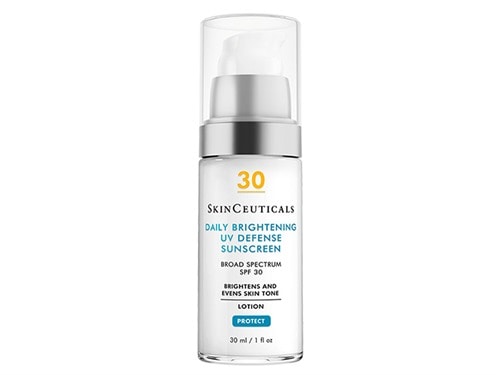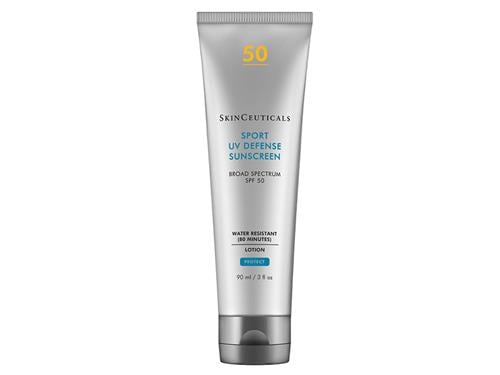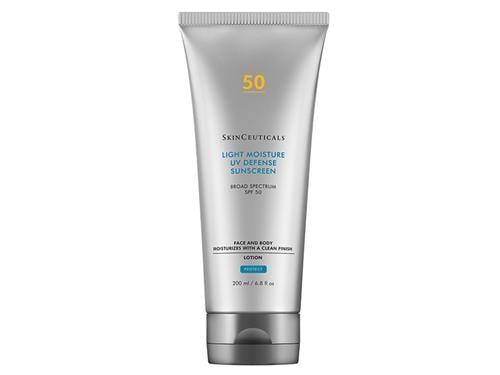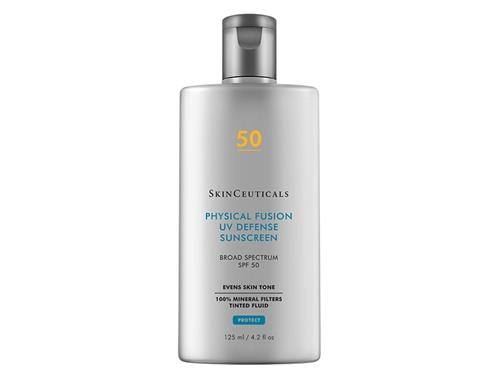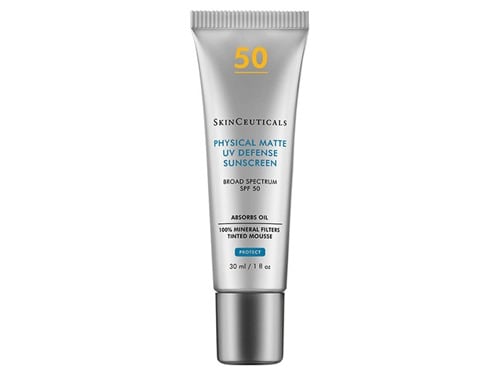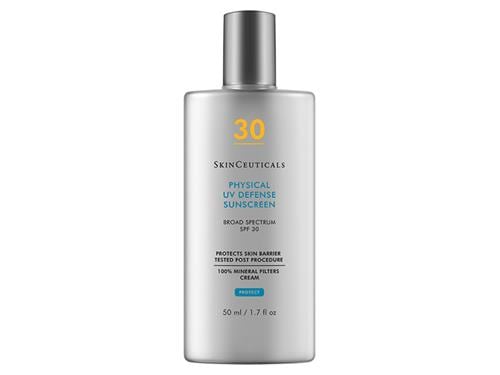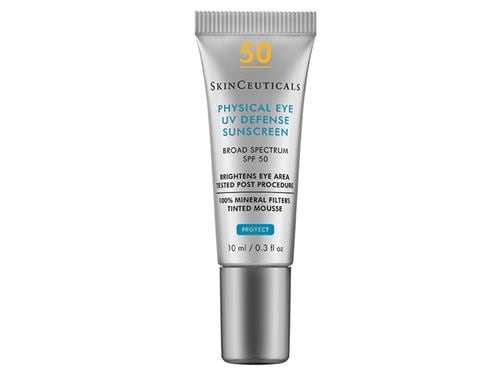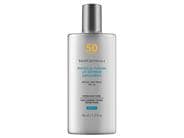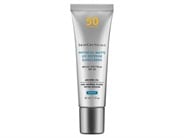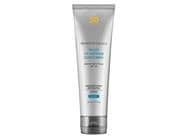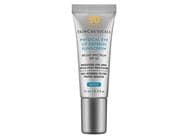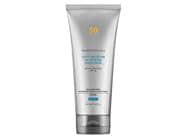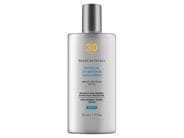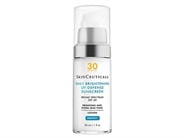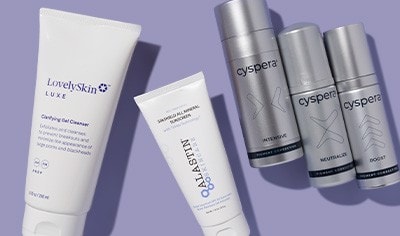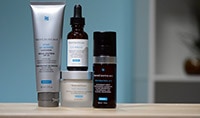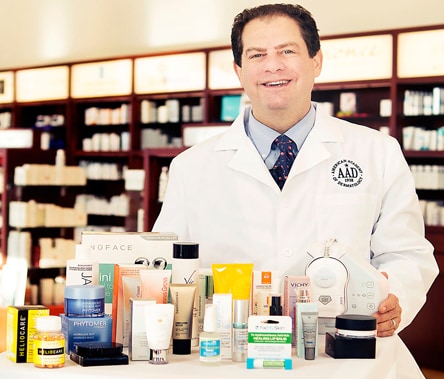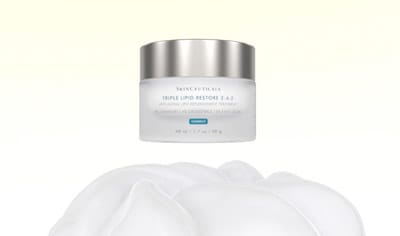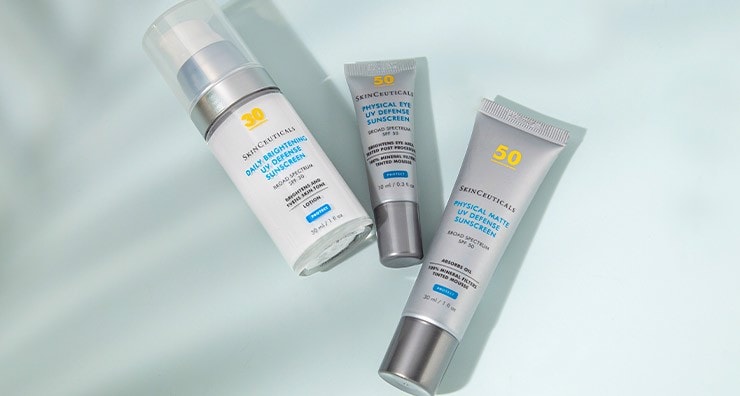
By now, you probably know the many benefits of sunscreen: using it daily can help prevent sunburn, reduce your risk of skin cancer and decrease signs of aging on your skin. However, when it comes to choosing what type of sunscreen to use—mineral vs chemical sunscreen—that’s where things start to feel a little confusing. If you’re wondering the difference between mineral and chemical sunscreen, we’ll fill you in with the help of board-certified dermatologist and LovelySkin CEO Dr. Joel Schlessinger and premiere skin care brand SkinCeuticals. Follow along as we answer questions such as:
- What’s the difference between mineral and chemical sunscreen?
- Which sunscreen should I use, mineral or chemical sunscreen?
- What chemical sunscreens should I try?
- What mineral sunscreens should I try?
Mineral Sunscreen vs Chemical Sunscreen
Let's start out first by saying that new sunscreen ingredients are rarer than full solar eclipses. The last "new" sunscreen ingredient that was approved by the FDA was in 1999 and, though there are eight ingredients that have awaited action since the early 2000s, nothing has been done or indicated by the FDA, which leaves us with imperfect and aging options for protection.
Mineral sunscreens (also called physical sunscreens) contain mineral ingredients that protect your skin by deflecting UV rays like a shield. The most popular active ingredients in mineral sunscreens are titanium dioxide or zinc oxide, and some formulas use a combination of both.
Chemical sunscreens contain ingredients that absorb UV rays like a sponge and keep them from damaging your skin. Some common active ingredients in chemical sunscreens include organic compounds such as oxybenzone, octisalate, octinoxate, avobenzone, octocrylene and homosalate. "The only chemical sunscreen with good UVA protection is avobenzone," Dr. Schlessinger says. "UVA and UVB are rays of light that can lead, respectively, to aging and burning of the skin."
While some sunscreens are all-mineral or all-chemical, there are also a number of options out there that combine both mineral and chemical ingredients in one formula for a more well-rounded product.
What’s the Difference Between Mineral and Chemical Sunscreen?
One major difference between mineral and chemical sunscreens is that mineral sunscreens generally protect your skin instantly, so you’re good to go right after application. Chemical sunscreens, on the other hand, can take some time to absorb into your skin, so application instructions often note you should apply at least fifteen minutes before sun exposure.
Because mineral sunscreens provide a physical barrier against the sun’s rays by sitting on top of your skin, they can sometimes be rubbed off more easily than chemical sunscreens or leave a white-ish cast on skin, though the best manufacturers of sunscreen have found ways to perfect these products so they go on more aesthetically.
Which Should I Use, Chemical Sunscreen or Mineral Sunscreen?
Dr. Schlessinger recommends chemical sunscreens for daily use for most people. “The active ingredients in chemical sunscreens offer the best results and are more likely to be the one you want to wear. They can usually get through a non-beach/non-outdoor activity day as well, which is so important. lengthen the time the sunscreen is available. You simply can’t get as good a sunscreen without the chemical ingredients,” he says. “That doesn’t mean you can’t have sun protection with a mineral sunscreen, but they don’t last quite as long, and they are a little thicker as far as texture goes.”
For children and people who are pregnant or nursing, Dr. Schlessinger recommends 100% mineral sunscreens. You might also choose mineral sunscreen if you have a skin condition such as eczema or rosacea. “Chemical sunscreens may cause some allergic reactions—generally it's less than 5% of people,” Dr. Schlessinger says. “I generally recommend a mineral-based sunscreen for my rosacea and sensitive-skin patients."
You should also opt for consider a mineral sunscreen over chemical sunscreen if you’re headed to the beach. Research has shown common chemical active ingredients such as oxybenzone, octinoxate, and octocrylene and others can possibly harm coral reefs and other marine life, so you should avoid wearing chemical sunscreens when swimming in the ocean. "Of course, swimming pools are fine to use chemical sunscreen and it may be important to wear chemical sunscreens in some water activities," Dr. Schlessinger says. "If doing so, please respect the environment and stay away from coral and wildlife if wearing chemical sunscreens."
Summer-Ready Sunscreens by SkinCeuticals
3 Chemical Sunscreens to Try:
SkinCeuticals Daily Brightening UV Defense Sunscreen
Looking for daily sunscreen that protects as well as perfects? This new debut from SkinCeuticals is SPF 30 and formulated with a quartet of chemical blockers—avobenzone, homosalate, octisalate and octocrylene—that work together to provide broad-spectrum coverage. Glycerin helps hydrate parched skin by drawing in moisture while a blend of niacinamide, phenylethyl resorcinol and tranexamic acid help reduce skin discoloration for a brighter look.
SkinCeuticals Sport UV Defense Hydrating Sunscreen SPF 50
Need sun protection that will stay put during heavy outdoor workouts and sweaty summer sports? This SPF 50 sunscreen is formulated to be sweat- and water-resistant for up to eighty minutes, and marathon runners have even put it to the test! Avobenzone, homosalate, octisalate and octocrylene team up to provide broad-spectrum protection while a plankton extract called artemia salina helps protect your skin’s collagen from UV damage.
SkinCeuticals Light Moisture UV Defense Sunscreen SPF 50
If you’re looking for sun protection and all-over moisture in one step, you may have met your match with this SPF 50 sunscreen. This formula is moisturizing while still maintaining a lightweight, quick-dry texture, so you can apply it on both your face and body. A blend of homosalate, octisalate, avobenzone and octocrylene provide supreme protection from the sun’s rays while hydrating glycerin helps keep skin feeling soft and smooth.
4 Mineral Sunscreens to Try:
SkinCeuticals Physical Fusion UV Defense Mineral Sunscreen SPF 50
If you’re craving something lighter weight than a traditional sunscreen cream, this feather-light facial sunscreen fluid is worth a try. It has a milky texture and a natural-looking tint that adapts to your skin tone and layers well with makeup. A blend of titanium dioxide and zinc oxide provide sun protection by deflecting damaging rays while antioxidant-rich artemia salina, a plankton extract, helps combat heat-induced stress on skin.
SkinCeuticals Physical Matte UV Defense Mineral Sunscreen SPF 50
If shine control is your goal, you’ll love this sunscreen’s long-lasting matte finish. It has SPF 50 thanks to a combo of titanium dioxide and zinc oxide and also contains aerated silica that can absorb fifteen times its weight in oil to help zap shine and keep your skin looking fresh and matte all day long. A sheer tint helps enhance all skin tones while silicone acts as a primer to provide a smooth base for makeup.
SkinCeuticals Physical UV Defense Sunscreen SPF 30
Is your skin easily irritated or feeling especially sensitive after a cosmetic procedure? This mineral sunscreen is formulated specifically to be gentle on post-procedural skin as well as sensitive and dry skin types. It has a lotion-like texture and contains glycerin to hydrate skin as well as shea butter to lock in moisture. Zinc oxide and titanium dioxide work together to provide broad spectrum SPF 30 protection as well.
SkinCeuticals Physical Eye UV Defense Tinted Mineral Sunscreen SPF 50
The skin around your eyes is often overlooked when it comes to sunscreen, so SkinCeuticals created this product specifically to protect delicate eyelids and under-eyes. It contains microfine titanium dioxide and zinc oxide to provide SPF 50 sun protection as well as ceramides to help smooth the skin around the eyes. This formula also has a sheer universal tint that acts as a primer for eye makeup, from concealer to eye shadow.
Looking to get the most out of your vitamin C serum? Learn more with these vitamin C skin care tips from SkinCeuticals.
Shop this blog
7 Best Replenix Products for Topix Repla...
Picking the Perfect Anthelios Product fo...
Follow us on social
Follow us on social networks and be one of the first to learn about sales, giveaways, and free samples

